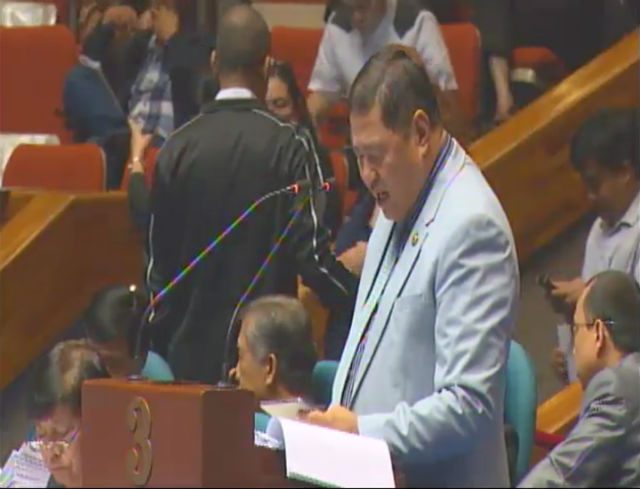SUMMARY
This is AI generated summarization, which may have errors. For context, always refer to the full article.

MANILA, Philippines – House justice committee chairperson Reynaldo Umali said on Wednesday, February 15, that data is “not necessary” in the discussion surrounding the reimposition of the death penalty for heinous crimes.
The Oriental Mindoro 2nd District Representative made this statement when anti-death penalty lawmaker Agusan del Norte 1st District Representative Lawrence Fortun threw at him one statistic after another showing the decreasing crime rate over the years.
During the resumption of the debate on House Bill Number 4727, Fortun brought up the 1987 Constitution provision that allows Congress to reimpose the capital punishment if it finds “compelling reasons involving heinous crimes.”
“What could be one of these compelling reasons, Madame Speaker? Maybe widespread criminality involving heinous crimes could be a compelling reason,” said Fortun, who then asked Umali if he knew about the Philippine Statistics Authority (PSA).
Umali said he did and brought up People vs Echegaray, the Supreme Court (SC) decision that upheld the death penalty conviction against Leo Echegaray in 1999.
“I have already stated pertinent portions of People vs Echegaray where the Supreme Court ruled that these data or statistics are not necessary for purposes of reimposition of the death penalty,” said Umali.
“In fact, as I mentioned in previous responses I made, if you will just read the papers, watch television, and/or listen to radio, on a daily basis, you will hear that these crimes are committed left and right. And to me, that is how to view that there is a compelling reason for the reimposition of the death penalty,” he added.
Fortun then cited PSA data showing there has been “a significant decrease every year in the crime rate in the country.”
“I would like to read for the record, Madame Speaker, it says here that for reported crimes total for index and non-index crimes in 2009 there was 502,665. In 2010, there’s 324 083. That’s a decrease of about 200,000. And in 2011, from 324,083 it decreased to 246,958. And in 2012, it decreased further to 217,812,” said Fortun.
He also cited data from the Philippine National Police’s Annual Report in 2015, which showed a decrease in the number of crimes from 2014 to 2015.
| Crime | Number of cases in 2014 | Number of cases in 2015 |
| Murder | 9,756 | 9,643 |
| Homicide | 3,349 | 2,835 |
| Physical injury | 65,763 | 49,845 |
| Robbery | 43,726 | 31,741 |
| Carnapping | 13,284 | 12,900 |
Umali himself had failed to provide latest data to prove his claim that the rate of crime in the Philippines is rising, when Albay 1st District Representative Edcel Lagman interpellated him last week.
Wrong source
Umali then argued that the SC itself already ruled that data is not important on the issue of capital punishment.
He responded to Fortun’s interpellation by quoting several lines which he claimed are from People vs Echegaray.
The lines he used, however, are actually found under Republic Act (RA) Number 7659, the law former president Fidel Ramos signed to reimpose the death penalty in 1993 before it was abolished by ex-president and now Pampanga 2nd District Representative Gloria Macapagal-Arroyo in 2006.
“But then again, I would like to quote pertinent portions of the case of People vs Echegaray which somehow rendered these statistics immaterial and I quote: It is immaterial and irrelevant that RA 7659 – this is the law that reimposed the death penalty in 1993 – cites that there has been an alarming upsurge of such crimes for the same was never intended by the said law to be the yardstick to determine the existence of compelling reason involving heinous crimes,” said Umali.
“Fittingly, thus, what RA 7659 states is that the Congress, in the interest of justice and public order, and rule of law, and the need to rationalize, harmonize, and penalize sanctions for heinous crimes, finds compelling reasons to impose the death penalty for said crime,” he added.
The House leadership is targeting to end the debate on the death penalty bill by March 8 despite the 50 lawmakers lined up to interpellate the measure’s sponsors. – Rappler.com
Add a comment
How does this make you feel?
There are no comments yet. Add your comment to start the conversation.